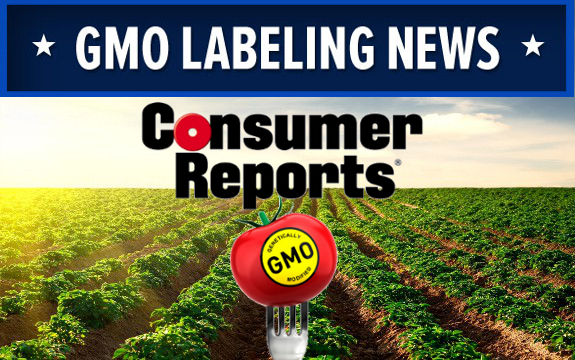Consumer Reports Advocates GMO Labeling

 Perhaps you’ve looked at Consumer Reports when searching for a car or washing machine to purchase, but now the heavyweight for consumer advocacy is throwing some serious weight around. Concerning what, you ask? Well, GMO labeling campaigns – a huge boon in a time when Monsanto, Dow, Pepsi-Co, Coca-Cola, Kraft, Cargill, Syngenta, etc. are having a heyday with our constitutional rights.
Perhaps you’ve looked at Consumer Reports when searching for a car or washing machine to purchase, but now the heavyweight for consumer advocacy is throwing some serious weight around. Concerning what, you ask? Well, GMO labeling campaigns – a huge boon in a time when Monsanto, Dow, Pepsi-Co, Coca-Cola, Kraft, Cargill, Syngenta, etc. are having a heyday with our constitutional rights.
Consumer Reports is known for publishing well-researched and comprehensive reviews on everything from SUVs to toaster ovens, but now they are supporting consumers as never before by telling the truth about genetically modified foods, and also sharing consumer opinions about what they think a food label should contain.
The company has revealed a set of compiled research on over 80 common products, and their results are telling:
- 2/3 of US residents equate ‘natural’ with ‘non-GMO,’ though this is sadly a false connection. The ‘natural’ label is practically meaningless, especially when you consider that companies like Pepsi and General Mills have been sued for using it while food products contained carcinogens and GMOs alike.
- Oddly, though many people think ‘natural’ means that a product contains no GMOs (and they have every right to assume that, though it isn’t currently true) out of over 1000 people surveyed, 3/4 said that NOT eating GMO was important to them.
- Many consumers are confused about current food labels since they are often inconsistent. What’s more, messages about what is really in their food is ‘hidden’ in ingredients with different names and confusing titles.
Click for enlarged image.
“GMO labeling should be required in the U.S., but in the meantime some food manufacturers are choosing not to use genetically modified ingredients and are noting that on their products’ packaging. To see how many foods have GMOs and whether you can trust the claims you see on food packages, we bought more than 80 different processed foods containing corn or soy between April and July 2014.
(Corn and soy are the two most widely grown genetically engineered crops in the U.S.) We tested at least two samples of each product, each sample from a different lot, to measure the GMO content. Then we compared our results with any non-GMO-related claims.”
You can see that full report here.
Consumer Reports has even gone so far as to send a letter to the Federal Trade Commission asking the agency to investigate the non-GMO claims on packages of Xochitl Totopos de Maiz corn chips after finding several instances of genetically engineered corn in the product.
Jean Halloran, director of food policy initiatives at Consumers Union, said in a statement:
“Shoppers are being misled when they buy products labeled ‘natural’ given their expectation that they are getting food that contain no GMOs. Foods that are frozen, made from concentrate or homogenized are all required to be labeled. Why shouldn’t products containing GMOs also be labeled?”
Consumer Reports director of consumer safety and sustainability, Urvashni Rangan, said on CBS:
“If a product didn’t have a claim on it, it was likely to contain GMO corn and soy.”
You can watch Rangan talk about GMOs from the Consumer Reports study, here.
Additional Sources:
